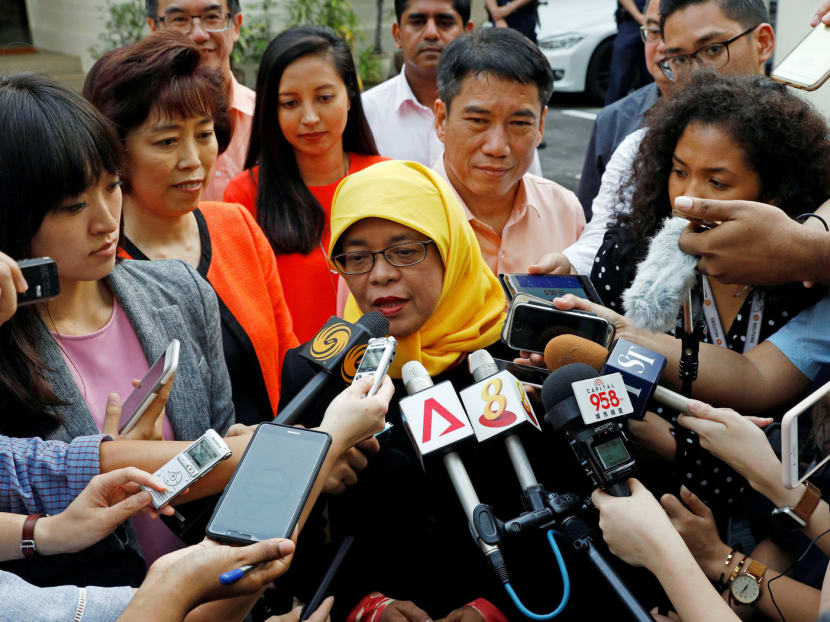No contest for Presidential Election shows eligibility criteria were kept high: Analysts
SINGAPORE — Lowering the bar to allow a contest for the Presidential Election would affect its credibility, especially since constitutional amendments were passed recently to make the criteria more stringent, said most political analysts whom TODAY spoke to yesterday.

Madam Halimah Yacob at the Elections Department on Monday after. Analysts said that lowering the bar to allow a contest for the Presidential Election would affect its credibility, especially since constitutional amendments were passed recently to make the criteria more stringent. Photo: Reuters
SINGAPORE — Lowering the bar to allow a contest for the Presidential Election would affect its credibility, especially since constitutional amendments were passed recently to make the criteria more stringent, said most political analysts whom TODAY spoke to yesterday.
They added that they had expected Madam Halimah Yacob, 62, to be the only candidate deemed eligible for the polls reserved for the Malay community. Even so, she may have to overcome the “burden” of winning the Presidential race via a walkover, if she successfully files her nomination papers tomorrow, they said.
While the former Speaker checked all the boxes of the eligibility criteria, having spent at least three years in a key public office, chairman of marine services provider Bourbon Offshore Asia Pacific Farid Khan, 62, and chief executive of Second Chance Properties Mohamed Salleh Marican, 67, had their applications rejected.
Under the amended Elected Presidency scheme, a prospective candidate from the private sector must have served as chief executive of a company with at least S$500 million in shareholder equity for at least three years, among other requirements. The companies of both Mr Farid and Mr Marican did not meet this requirement, although the Presidential Elections Committee (PEC) had the discretion to certify them to stand for election.
Institute of Policy Studies deputy director for research Gillian Koh said if the PEC approved the application of either Mr Farid or Mr Marican —whose firms’ respective shareholding equity clearly fell below the criterion — it would have to explain in detail how their experience made up for the shortfall. “(PEC would also have to) do so effectively to ensure that the criteria can be upheld and the decision, viewed as credible. It sets a precedent for other decisions in the future,” she said. “At issue is really the credibility and legitimacy of the system,” she added.
National University of Singapore political scientist Bilveer Singh said that if Mr Farid or Mr Marican were allowed to contest, it “would have greatly depreciated the whole concept of an elected President where unqualified candidates participated”.
He said: “If we have agreed upon certain rules and regulations, we should stick to them, especially when it comes to candidates meeting clearly laid out criterion for an elected office of great importance.”
Agreeing, Nanyang Technological University Assistant Professor Woo Jun Jie said it “would have set a bad precedent for the two candidates to be approved through the deliberative track”.
But SIM Global Education associate lecturer Felix Tan felt that Mr Farid and Mr Marican could have been given the opportunity to contest under the deliberative track, without undermining the scheme.
“Whoever the candidates are ... (they) will still need to meet the requirements as set out by the (PEC) and it will be very meritocratic within the constraints of the reserved election scheme,” he added.
The analysts, however, noted that the public were hoping for a contest.
Singapore Management University law don Eugene Tan felt that an impending walkover in the inaugural reserved Presidential Election would be a wasted opportunity, not least for Mdm Halimah herself.
He said: “It’s a burden that she shouldn’t have to bear but I think it comes as a price for any candidate (in a Presidential Election) who is closely identified with the establishment.”
He added that he hoped the outcome would not reinforce the public opinion that the Malay community did not have capable individuals who were willing to step forward to contest.
Still, he stressed that even though Mdm Halimah was the only eligible candidate, she would be “duly elected” if her nomination goes through.
Dr Koh reiterated the significance of Mdm Halimah’s probable elevation to the highest office of the land. “(She) is a double minority — not only is she a Malay-Muslim individual but a female,” she said.
However, she added: “Of course, the statement of our acceptance of diversity would have been all the more powerful from day one if there had been an open contest.”









